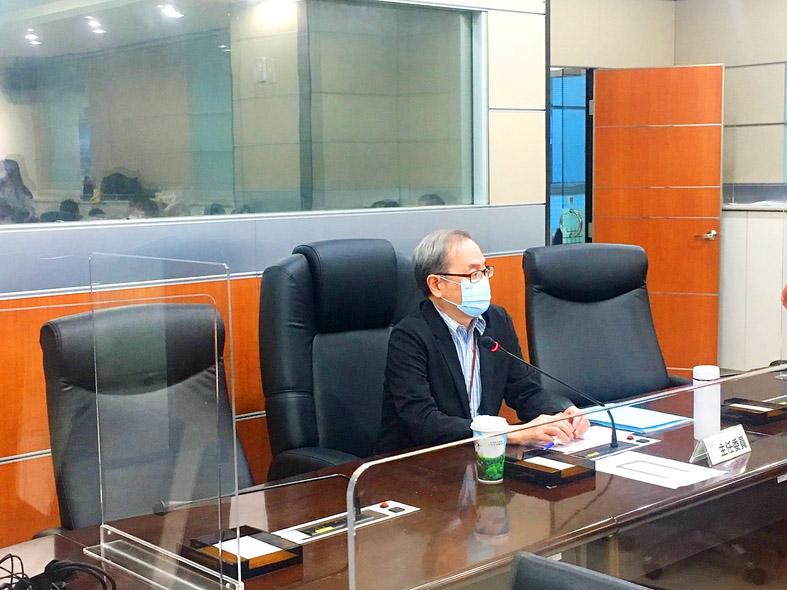The Atomic Energy Council (AEC) is planning to spend more than NT$500 million (US$17.77 million) on early warning, monitoring and research activities focused on the waters around Taiwan, the council said yesterday.
The statement came after Japan on Tuesday last week announced that it plans to release processed wastewater from the wrecked Fukushima Dai-ichi nuclear power plant into the ocean in several years.
However, the council said that it had made preparations for such a move ahead of Tokyo’s announcement.

Photo: Yang Mian-chieh, Taipei Times
Four years ago, its Radiation Monitoring Center was tasked with monitoring the waters, while a three-pronged strategy would be adopted in the future, the council said.
These would include cooperation with the Ocean Affairs Council to establish an early warning system and the development of monitoring technology to more precisely assess ocean currents, the council said, adding that the measures would cost about NT$128 million and be in place in about one-and-a-half years.
Once that infrastructure is set up, the council would in a four-year program monitor the situation and conduct research, and publish a comprehensive environmental impact assessment, the council said.
These measures would cost NT$400 million to NT$500 million, it said.
The council would also increase the number of offshore radioactivity detectors, it said.
Thirty-three detectors are in operation, and another 62 are to be created by the Fisheries Research Institute before the end of this year, it said.
The council would also seek cooperation with International Atomic Energy Agency (IAEA) investigators, it said.
As China is a member of the international body, it would be difficult for Taiwan to join, AEC Minister Hsieh Shou-shing (謝曉星) said.
The council would try its best to participate in the investigation team and monitor nearby waters, he added.
In case the IAEA rejects Taiwan’s bid, he hopes that the agency would share data from its monitoring operations with the nation, Hsieh said.
Wastewater from the Fukushima Dai-ichi plant is to be diluted to 1,500 becquerels of tritium per liter before it is discharged, Hsieh said, adding that it is within the limits set by the IAEA.
The human body would be able to process that amount within one month, he said.
However, a continuous risk assessment is needed, Hsieh said, reiterating that he opposes Japan’s plan.
People who are concerned that fish might contain radionuclides should not consume it, Hsieh said.
In related news, a simulation developed by a team led by Ho Chung-ru (何宗儒), a professor in National Taiwan Ocean University’s Department of Marine Environmental Information, showed that daily discharges of wastewater at the plant would have a 1 percent chance of affecting the waters near Taiwan, while it would take just one and a half years, at the earliest, for it to possibly affect Taiwan’s offshore waters.
The actual spread of the wastewater — including the range and speed — would depend on factors including the location of its release and the climate, the university said.

The Ministry of Economic Affairs has fined Taobao NT$1.2 million (US$36,912) for advertisements that exceed its approved business scope, requiring the Chinese e-commerce platform to make corrections in the first half of this year or its license may be revoked. Lawmakers have called for stricter enforcement of Chinese e-commerce platforms and measures to prevent China from laundering its goods through Taiwan in response to US President Donald Trump’s heavy tariffs on China. The Legislative Yuan’s Finance Committee met today to discuss policies to prevent China from dumping goods in Taiwan, inviting government agencies to report. Democratic Progressive Party Legislator Kuo Kuo-wen (郭國文) said

The Ministry of Economic Affairs has fined Taobao NT$1.2 million (US$36,900) for advertisements that exceeded its approved business scope and ordered the Chinese e-commerce platform to make corrections in the first half of this year or its license would be revoked. Lawmakers have called for stricter supervision of Chinese e-commerce platforms and more stringent measures to prevent China from laundering its goods through Taiwan as US President Donald Trump’s administration cracks down on origin laundering. The legislature’s Finance Committee yesterday met to discuss policies to prevent China from dumping goods in Taiwan, inviting government agencies to report on the matter. Democratic Progressive Party

Taiwan and its Pacific ally Tuvalu on Tuesday signed two accords aimed at facilitating bilateral cooperation on labor affairs, according to Taiwan’s Ministry of Foreign Affairs (MOFA). The governments inked two agreements in Taipei, witnessed by Foreign Minister Lin Chia-lung (林佳龍) and visiting Deputy Tuvaluan Prime Minister Panapasi Nelesone, MOFA said in a news release. According to MOFA, the agreements will facilitate cooperation on labor issues and allow the two sides to mutually recognize seafarers’ certificates and related training. Taiwan would also continue to collaborate with Tuvalu across various fields to promote economic prosperity as well as the well-being of their

Sung Chien-liang (宋建樑), who led efforts to recall Democratic Progressive Party (DPP) Legislator Lee Kun-cheng (李坤城), was released on bail of NT$80,000 today amid outcry over his decision to wear a Nazi armband to questioning the night before. Sung arrived at the New Taipei District Prosecutors’ Office for questioning in a recall petition forgery case last night wearing a red armband bearing a swastika, carrying a copy of Adolf Hitler’s Mein Kampf and giving a Nazi salute. Sung left the building at 1:15am without the armband and covering the book with his coat. Lee said today that this is a serious